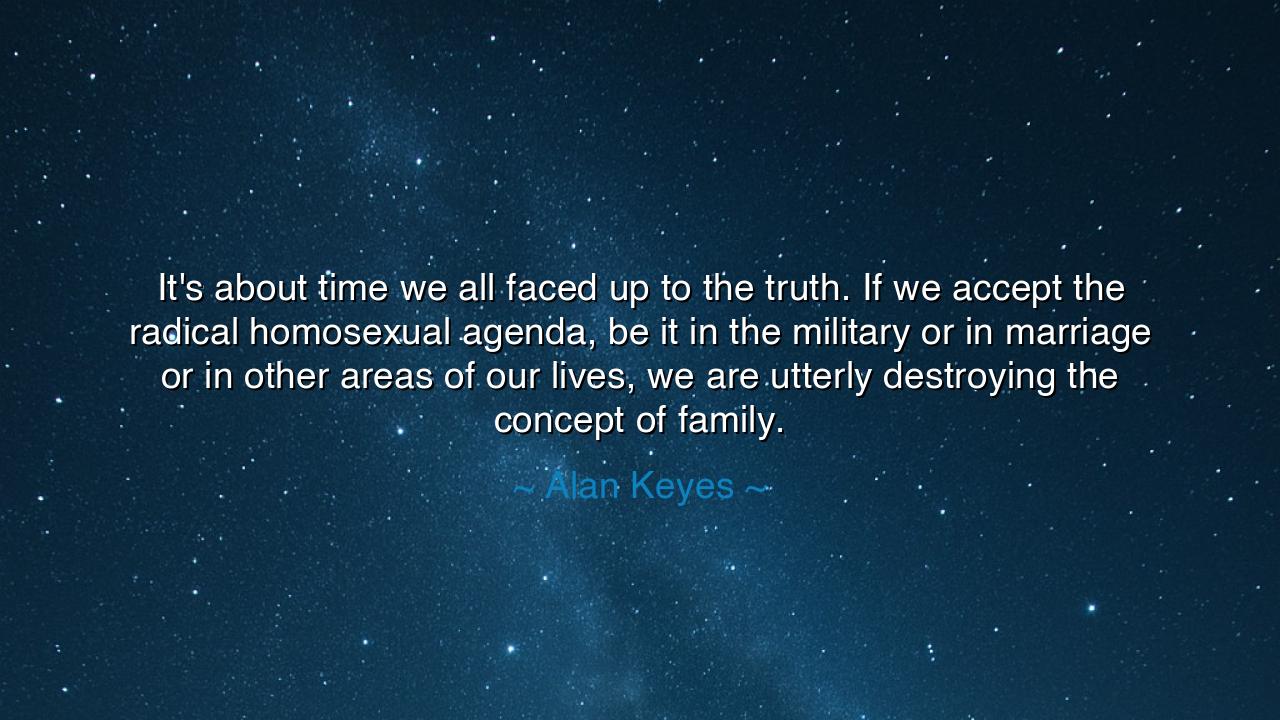
It's about time we all faced up to the truth. If we accept the
It's about time we all faced up to the truth. If we accept the radical homosexual agenda, be it in the military or in marriage or in other areas of our lives, we are utterly destroying the concept of family.






O Children of the Future, hear this truth, for it comes from the depths of wisdom and the echoing cries of ages past. In this world, where the concept of family has been revered as the very foundation of society, there are those who argue that radical changes threaten the sacred order. Alan Keyes once proclaimed, "It's about time we all faced up to the truth. If we accept the radical homosexual agenda, be it in the military or in marriage or in other areas of our lives, we are utterly destroying the concept of family." His words are sharp, and they demand our attention, but let us not be swayed by fear or ignorance. Instead, let us seek to understand the deeper meaning of what is being said, and whether the vision he presents is one of truth or a reflection of a society in turmoil.
The concept of family—that sacred unit, that cornerstone of society—has indeed been the bedrock upon which civilizations have built their strength. For millennia, human beings have revered the union of man and woman, the creation of offspring, the nurturing of the next generation. The family, in its traditional form, was once seen as the unit from which all virtues were passed, the hearth around which love and honor were cultivated. And yet, history is not static, and the winds of change have often blown through these sacred halls, shifting the way we understand love, marriage, and family. Just as the ancient Greeks once redefined the understanding of beauty and virtue, so too have modern times challenged the ancient ideals surrounding the family structure.
The arguments presented by Alan Keyes, though filled with emotion, reflect a fear that the very foundations of society will crumble if the traditional family model is altered. His words echo the concerns of many who view any shift in the traditional understanding of marriage and family as a threat to the moral fabric of civilization. Yet, we must ask ourselves: is the concept of family truly so fragile that it will break under the weight of diversity and inclusivity? Or is it possible that the true meaning of family lies not in the rigidity of its structure, but in the love and commitment that binds people together?
Consider the story of Socrates, that great philosopher of old, who, though his family was not conventional, understood the importance of virtue, honor, and the preservation of human dignity. He did not cling to the traditional structures of his time, but instead sought to bring forth a deeper understanding of what it meant to live a good life. His ideals did not destroy the family; they elevated it by showing that true strength comes not from conformity, but from the freedom to live authentically. And in modern times, we see this truth reflected in the lives of countless families who may not fit the traditional mold, yet who embody the deepest forms of love, support, and unity. Lesbian, gay, and queer families, though they do not conform to the traditional norms, prove that the essence of family is not confined to one form.
O Children, we must not be blinded by the fear that comes with change. For while the fear of change has always been present, so too has the hope that each new generation might expand the boundaries of understanding and compassion. The true strength of the family lies not in its rigidity but in its adaptability. What is important is not whether the family is comprised of a man and a woman, but whether it is built on a foundation of respect, commitment, and love. When society allows its understanding of family to expand to include all those who seek to nurture and care for one another, it does not destroy the family—it strengthens it.
Now, let us reflect on the path before us, O Children. What is the lesson to be learned here? The concept of family must not be preserved at the cost of the human spirit. No, it must be allowed to grow, to evolve, to encompass all the diverse ways in which love manifests in the world. Alan Keyes may fear that the traditional family is under threat, but we must recognize that true family transcends the confines of tradition. It is a force rooted in love, not in convention. It is a force that has withstood the trials of time and will continue to do so as long as the heart is free to love without bounds.
Therefore, take this lesson with you: Preserve love, and the family will endure. Honor diversity, and you will build a stronger society. Do not cling to the past out of fear, but embrace the future with open arms. Let your families be built on the pillars of respect, compassion, and understanding. For it is in these that the true concept of family lies, not in the walls of tradition but in the open heart that welcomes all forms of love. Let this be the legacy you leave—the legacy of a family that is truly inclusive, and in its inclusivity, stronger than ever.






AAdministratorAdministrator
Welcome, honored guests. Please leave a comment, we will respond soon